|
One Off

My Bhasha Your Bhasha
 |
Photo: Amirul Rajiv |
When this sees the print, we will have just observed the Shaheed Dibash, now the International Mother Language Day. And a lot will have been written on the subject. So I shall try not to seek the indulgence of the readers' patience to add to their burden. Instead I would like to dwell upon a debate that had started a couple of years back on standardising Bangladeshi Bangla in various media and has recently re-emerged in various websites where Bangalis surf along and argue or express their opinion. What should be our Bangla for as a medium of expression in a formal situation? The admix of dialect we speak? Or what is known as promito Bangla? The propagators of dialects are of the opinion that Promito or standard Bangla that is usually found in the books cannot be 'our' Bangla. We should speak, write and express ourselves in the Bangla that we speak in our daily lives. 'We' who? We are those that live in or around the city of Dhaka or some of the towns towards central Bangladesh. One propagator of this once even said that our written Bangla would have to metamorphose into how we usually speak in our day-to-day life in Dhaka. Well what will happen in the future only future can tell because we live in a dynamic world. The controversy arises when someone tries to impose their opinion as that of a nation. Some writers have ridiculed a post written by Syed Badrul Hasan in the Daily Star, recording his dissent on mispronunciations in the Bangla words by the TV newsreaders and announcers. His comments were taken to be tantamount to an affront to our 'very' homegrown Bangla. Though I do not recall the columnist saying anything on the dialects in the plays that are performed in Bangladesh, he was taken to task for even indulging in such audacious comments as to refrain from using dialect in our expressions. Well I am not against using of dialects as the linguistic vehicle in any form of literature. Indeed some of the most popular and successful plays that I have acted in, namely, Nural Deener Shara Jiban or Dewan Gazir Kissa (Rangpur and Jessore) were written in dialect. But then these plays and many others like Dhaka Theatre's Haat Hodai or quite a few of Aranyak's plays were performed with alacrity in dialect. So there should be no debate about the use of dialect in any written or spoken art form as long as that expresses the content of a particular area in the language of its own. But a very valid debate may ensue if some one tries to impose that or an admixture of various dialects as the “language of Bangladesh”. It might not be out of place to mention what Rabidranath had once said, when he was asked why he did not write some thing in dialect? He said that he was the poet of Bengal so he has to write in a Bangla that was understood by every one in Bengal. He said if he had written in Chittagong dialect would he be understood in Rangpur or would a Sylheti understand the dialect of Rajshahi?
I remember an argument between one of our leading playwrights and a very famous actress a couple of years ago. The playwright had said that why shouldn't I use this hybrid dialect in our plays? It is indeed the language that I speak in? The actress coolly said, “you do; I don't, period.” It might not be out of context that in our Jatras the language had always been classical Bangla that made hundreds of thousands of illiterate or half literate Bangalis cry their hearts out or laugh ceaselessly. There was no question to the degree of their understanding of that language.
Syed Badrul Hasan had said about very common Bangla words which were mispronounced in our electronic news. This seems to be a very common phenomenon. I think this happens because of the lack of training in the media concerned. So this has to be redressed by introducing some kind of systematic work shopping with the incumbent news readers by specialist speech trainers now quite easily available in our country. In order to address the mispronunciation of the names of places and people (both local and foreign), the selection of the news readers must be made very carefully. The person who reads the news must 'own' the news. She or he must know the wherewithal of the place or the person she/he is reading about. Or else we shall continue to be plagued by words that would seem strange and ghastly to say the least. Ekushey is also the international mother language day and therefore we should be respectful about the language of others and be careful in dealing with any language from anywhere in the world.
Copyright (R) thedailystar.net 2008
|
